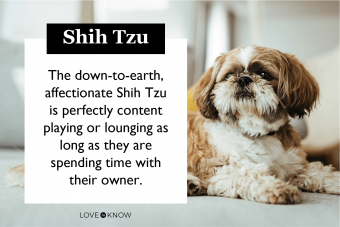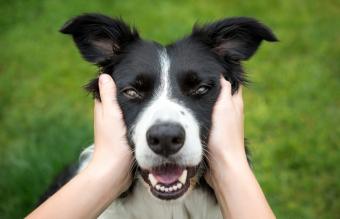
The Shih Tzu is an ancient breed, but these dogs continue to be extremely popular due to their adorable good looks and timeless good nature. In many ways, Shih Tzus are ideal family companions, but they do require a lot of care to maintain their luxurious coat. If you're looking for a breed that is a virtual "love sponge," the Shih Tzu is a very good choice.
Origin and History
According to the American Kennel Club (AKC) breed history, the Shih Tzu is one of several breeds that was kept and developed in the ancient palaces of China from Tibetan breeding stock. The breed's existence can be documented as far back as 624 A.D. It's believed these dogs were the smallest and the oldest of all the dogs the Tibetans believed to be holy.
The breed almost became extinct during the communist revolution in China, but some specimens were smuggled out of the country. Today, the entire breed owes its current existence to just seven males and seven females. The breed received official recognition from the AKC in 1969.
Breed Characteristics

The Shih Tzu was bred to be a companion and that's exactly what they have become. They're affectionate and loyal, and are known for following their owner from place to place.
Appearance
The Shih Tzu is a merry little dog that is highly prized for their sweet disposition. According to the breed standard, on average, these dogs stand 9 to 10 1/2 inches tall at the shoulder, but they should be no less than 8 inches or more than 11 inches tall. The ideal weight is between 9 and 16 pounds, and the weight should be in proportion with the dog's overall size.
These dogs are more substantial than the average Toy breed due to their heavier bones. The body should be slightly longer than the dog is tall, and the topline should be level. These dogs are compact; they should never appear leggy, yet they should also not look like caterpillars. The tail should be set high on the rear and carried over the back with a gentle curve.
Their head is very round with a domed forehead, deep stop, and short muzzle. Their bite is undershot, which means the bottom front teeth should close neatly in front of the upper front teeth, but the jaw should not be so undershot that the teeth still show when the mouth is closed. These dogs have soulful, big brown eyes. The ears hang down. They are moderate in length, but they look much longer when the hair is allowed to grow naturally.
These dogs have a long, flowing, double coat that grows continually throughout their lives. The hair on the head is banded in a top knot unless the dog is kept trimmed. All colors and markings are permissible.
Dogs of this breed should move freely and naturally hold their heads high and their tails gaily over their backs. Their movement is fluid and straight. They should display good reach in front and equally good drive in the rear.
Personality

This breed makes a great family pet. Their temperament is open and loving, and even though they may choose one person as most special to them, they are happy to share their love with anyone who will return it. Shih Tzus are generally very good with children as long as the children handle them properly. It is up to adults to supervise playtime, since it would be unreasonable not to expect any dog to react protectively if they are being treated roughly.
These dogs are generally happy-go-lucky, and unlike some Toy breeds, they do not normally display hyper personalities. They are happy to play with you, but totally willing to go lay down somewhere out of the way and take a nice break. They are also not known to be nuisance barkers.
Training
Shih Tzus are very intelligent. You can literally see their thought processes playing out through their eyes. Potty training is not very difficult as long as you are consistent with your efforts. Many Shih Tzus will learn to give you a signal when they wish to go out.
These dogs also do well in obedience and agility trials, and training them is fun for both dog and owner. Shih Tzus want nothing more than to please you and spend time together, so keep the training full of positive reinforcement. Shih Tzus do not respond well to scolding, and they will stop responding to your efforts if they feel threatened or become upset.
Exercise Requirements

Shih Tzus do quite well when they receive moderate exercise. A daily walk of 15 to 20 minutes is sufficient to keep them toned, and the fresh air and change of perspective provide good mental stimulation. Keep in mind, though, that these dogs can be real couch potatoes. If you neglect to walk them on a regular basis, they'll likely become overweight.
Health Issues
According to the American Shih Tzu Club, here are some of the main health problems the Shih Tzu is prone to experience:
- Heatstroke: Due to their short snouts, they aren't able to cool off as easily as other breeds and are prone to heatstroke.
- Patellar luxation: Dislocation of the kneecap; the kneecap often slides back and forth, causing pain and discomfort.
- Ear infections: The Shih Tzu is prone to ear infections due to their drop ears, which create a dark, warm ear channel, ideal for infection. Their ears should be cleaned once per week consistently.
- Retained baby teeth: The Shih Tzu's baby teeth may remain intact when their permanent teeth emerge. In some cases, this doesn't cause any problem, but the baby teeth may need to be extracted in other cases.
- Portosystemic Liver Shunt: A genetic abnormality in which blood vessels allow blood to bypass the liver.
Seek a responsible breeder who screens their dogs for genetic conditions, including patellar luxation, hip dysplasia, and various eye conditions, such as progressive retinal atrophy and corneal dryness, among others. This breed is healthy overall, but finding the right dog who is free of these health issues will save you a lot of heartache down the road.
Lifespan
The Shih Tzu's life span ranges between 10 to 16 years. Their average lifespan is around 13 years old. As is typical of most small dog breeds, the Shih Tzu is typically longer-lived than most larger dog breeds. Provided they have a healthy lifestyle that includes moderate exercise and a good diet, you can expect to spend many happy years with your pup.
Grooming
A Shih Tzu kept in full flowing coat is a glorious sight to behold; however, this is simply not feasible for the average house pet. This small dog has what is known as a double coat. The human-like hair of the outer coat is supported by a softer, more cottony undercoat. There are several different ways to groom a Shih Tzu, so choose one that works best for your dog's style.
Additional tips for the home groomer include:
- Wash the dog's face and beard at least every other day to prevent staining and remove eye debris.
- Give the dog a full bath every two weeks.
- Clean out the dog's ears once a week and remove excessive hair growing within the ears by gently pulling it out in small sections at a time.
- Brush the dog's teeth three to four times a week, at minimum.
- Keep an eye on the nails and trim as needed.
On a related note, many allergy sufferers report that they have very little reaction to Shih Tzu hair, unlike other dog coats, and therefore consider these dogs somewhat hypo-allergenic.
Fun Facts About the Shih Tzu
The Shih Tzu is among the most popular dog breeds and there have been some interesting facts discovered along their way to popularity:
- Shih Tzus have been owned by Nicole Richie, Mariah Carey, Beyoncé, Bill Gates, and even Queen Elizabeth II.
- In 2014, a Shih Tzu became the first of his breed to win in agility. Despite their fragile-appearance, they're actually excellent at the sport.
- Every Shih Tzu alive today may be traced back to one of 14 dogs -- 7 males and 7 females -- who were used to reestablish the breed after their numbers dropped to nearly zero during the first part of the twentieth century.
- The hair on Shih Tzu's faces grows in all directions, earning them the moniker "chrysanthemum-faced dogs."
- In the late 1940s and 1950s, American servicemen stationed in Europe brought Shih Tzu dogs back to the United States.
Purchasing or Adopting a Shih Tzu

If you're set on a puppy from a breeder, you can begin by searching the AKC Marketplace. The American Shih Tzu Club also offers an online directory of breeders. Although breeders in this club have signed a code of ethics, it's still important to do your research and determine if the breeder meets your standards.
Rescue a Shih Tzu
If you don't mind adopting a puppy or adult Shih-Tzu, rescue organizations are a perfect place to look. Although sometimes you may find a puppy, most are adult dogs. Begin your search using PetFinder or Save-a-Rescue. You can also search through breed-specific rescues:
- Peke a Tzu Rescue is a non-profit organization that places their dogs in foster homes until they find their forever home. They are located in Trufant, Michigan.
- Shih Tzus and Furbabies is located in St. Mary's, Georgia, and has Shih Tzus of all ages.
- Lend a Helping Paw Shih Tzu Rescue is a non-profit, all-volunteer organization based in Michigan.
- Shih Tzu Rescue is a non-profit organization operating in south Florida.
- California Shih Tzu Rescue, part of the Rescue Me! network, operates in California.
Is the Shih Tzu Right for Your Family?
Shih Tzus make delightful companions, but they do require quite a bit of grooming to keep them in good shape. Before you decide to bring one home, visit several breeders, and ask at least one of them to demonstrate the right way to brush through the coat in layers, because this is essential to preventing mats. Get to know the personality on these dogs first hand, and then you can decide if this is the right breed for you.







